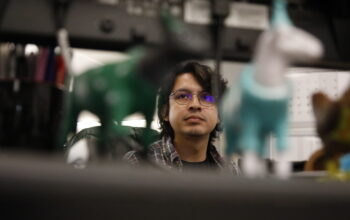Emily Kelley / Roundup
Imagine going to the doctor for a routine physical and discovering you have AIDS.
This was the reality for Steve Bolan, a volunteer speaker from “Being Alive,” a grassroots organization that helps people living with AIDS.
Bolan spoke to students at Pierce College as part of HIV/AIDS Awareness Week, along with other speakers.
Acquired immune deficiency syndrome, otherwise known as AIDS, is an immune disease that is caused by the human immunodeficiency virus (HIV).
Pierce has hosted awareness events for 20 years, typically semi-annually, according to Bolan, who has participated as a speaker for seven years.
Bolan moved to California from Michigan in 1969 to work for Columbia Pictures as a trailer maker.
He became sexually aware in the 70s, and full advantage of the sexual revolution.
“Back then, gay people didn’t use condoms. What the hell did we need condoms for? Nobody was going to get pregnant,” said Bolan. “I guess the last laugh was on us, that’s for sure.”
Years later in 1983, Bolan went in for a physical after he turned 40 and the doctor discovered he had an “opportunistic” disease called thrush, a yeast infection in the mouth that can be brought on by a weakened immune system.
The first cases of AIDS were reported by the Centers for Disease Control and Prevention (CDC) in June 1985 in Los Angeles, after an increase in a rare lung infection was noticed by a drug technician. Five gay males were tested and the report is said to have been the beginning of AIDS awareness in the U.S.
So when Bolan was diagnosed, information and treatment of AIDS was very minimal.
“When I was diagnosed, there were no medications,” said Bolan.
AZT, the first drug approved by the Federal Drug Administration to treat HIV/AIDS, wasn’t available until 1987. People taking AZT had to take 2 pills every 6 hours.
“You woke up in the middle of the night with your alarm clock screaming ‘you’ve got AIDS, you’ve got AIDS,'” recalled Bolan.
Bolan said that his life changed 100 percent after he was diagnosed.
“It affected emotionally. When I would read the Hollywood trade papers, I would read a bunch of obits. I felt like a ticking time bomb,” said Bolan.
Bolan said that his friends were his biggest support system, although most of them did not have AIDS.
“They listened to me and cared about me,” said Bolan. He also said that he regretted never telling his parents.
Bolan and his partner practice safe sex, since “the more complex your virus is the harder it is to treat.”
He also advises that if you’re at risk, either with sex or drug use, you should get tested routinely, instead of when the symptoms start. He also said that if you test positive to get treated immediately.
Over the years, Bolan has donated to organizations like AIDS Project L.A., has participated in gay-rights protests, and volunteered for “Being Alive” as both a support group leader and a speaker.
“I probably infected someone along the way, and I’d like to make up for any possible sins I may have committed.”
According to the CDC, as of 2003, there are more than 1 million people living with AIDS in the United States alone. Of this, one-fourth is unaware they are infected.
David, who asked for his last name to be withheld, was another speaker during AIDS Week who didn’t think he was at risk until he tested positive.
David grew up here in the San Fernando Valley and showed off a picture of him and his siblings, saying that there was an “unspoken pecking order” between them.
“I was always the goody two-shoes.”
He attended Birmingham High School and then went to UCLA, before going back east for dental school.
After graduating, David tried drugs and started getting “delayed gratification” he missed while working hard in school, including sex.
“I wasn’t too particular on who I had sex with,” said David.
However, he married young, opened his own dental practice and didn’t think much of his previous sexual encounters.
“Life was great. It was working out just like I had planned,” he said.
In 1987, he attended a dental convention the featured a both related to HIV and AIDS, since dentists could be at high risk for contraction.
David participated in an anonymous test, but didn’t think he was at risk.
Weeks later, just around dinnertime, there was a knock on his door.
“I immediately thought about the testing,” said David.
He was informed that he had tested positive and that they would like to take another blood sample, as well as one from his wife.
David said some of his first thoughts were “I’ve lost everything” and “My parents are going to have to bury me.”
He told his wife first, who thought he was joking.
“I told her she should leave me,” said David. With tears in his eyes, he recounted that his wife stayed and tested negative for the disease. They are still married and have two children.
David said that he didn’t want to tell anyone, because of the stigma that went along with having AIDS at the time.
“I felt so dirty. Everything disgusted me about myself,” said David.
There were no support groups for heterosexuals, so David and his wife went to groups for gays and lesbians when he was first diagnosed.
He and his wife decided to have children a year later, and used a sperm donor for both their son and their daughter.
It wasn’t until s
even years later when he thought he was going to die, that David decided to tell his family.
even years later when he thought he was going to die, that David decided to tell his family.
He said they were “heart broken,” that there was a lot of crying and that his sister even got therapy. He told his children about his positive status when they each turned 13.
He mirrors Bolan’s advice to get tested because “it’s not written on everybody’s forehead what STD’s they have,” and to get treatment if you are positive.
David joined “Being Alive” in 2001 and said he “speaks for the dead.”
Bolan feels that if he can get “even one student from each class that he talks to get tested, it might make up for his sins.”
“Why not get tested?” said Bolan. “Even if it’s a one in a 1,000 chance, it’s not worth the risk.”
—
ekelley.roundupnews@gmail.com

Steve Bolan addresses Pierce College media arts students today on the upcoming HIV/AIDS Awareness Week. Bolan is a member of “Being Alive,” a coalition that offers services from education to support. (Elliot Golan / Roundup)



